WHEELS of INDUSTRY
Page 38
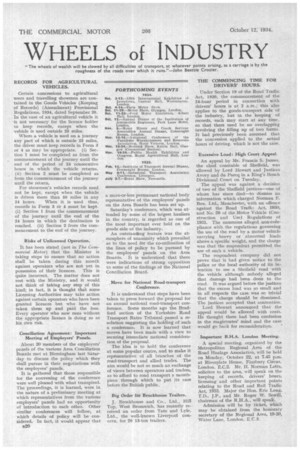
Page 39
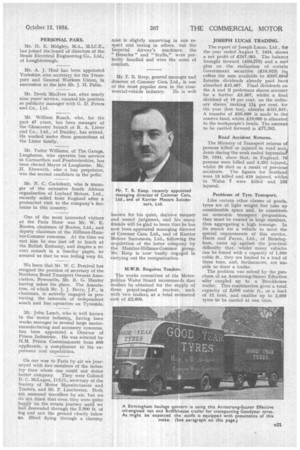
Page 40
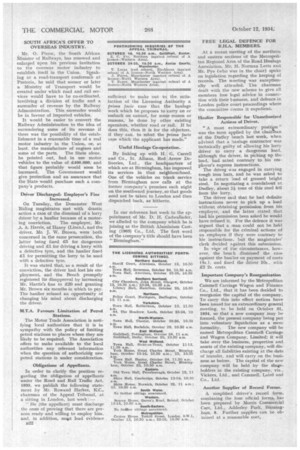
Page 41
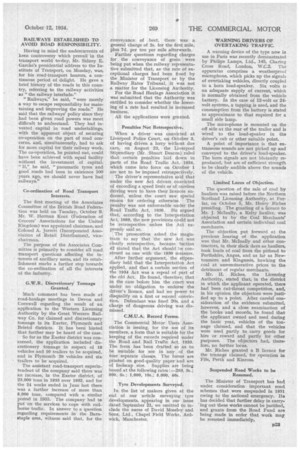
Page 42
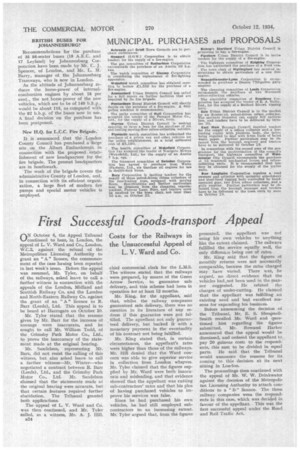
If you've noticed an error in this article please click here to report it so we can fix it.
"The wheels of wealth will be slowed by all difficulties of transport, at whatever points arising, as a carriage is by the roughness of the roads over which it runs."—John Beattie Crozier.
RECORDS FOR AGRICULTURAL VEHICLES.
Certain concessions to agricultural users and travelling showmen are contained in the Goods Vehicles (Keeping of Records) (Amendment) Provisional Regulations, 1934, dated September 20. In the case of an agricultural vehicle it is not necessary for the licence holder to keep records, except when the vehicle is used outside 25 miles.
Where a vehicle is used on a journey any part of which is outside 25 miles, the driver must keep records in Form 3 or 4 as may be appropriate. (i) Section I must be completed as from the commencement of the journey until the end of the period of 24 consecutive hours in which the vehicle returns. (ii) Section 2 must be completed as from the commencement of the journey until the return.
For showmen's vehicles records need not be kept, except when the vehicle is driven more than 50 miles in any 24 hours. When it is used thus, records in Form 3 dr 4 must be kept. (i) Section 1 from the commencement of the journey until the end of the 24 hours in which the destination is reached. (ii) Section 2 from the commencement to the end of the journey.
Risks of Unlicensed Operation.
It has been stated (not in The Commercial Motor) that the Minister is taking steps to ensure that no action shall be taken during this month against operators who are not yet in possession of their licences. This is quite incorrect. The matter does not rest with the Ministry, and it would not think of taking any step of this kind; in fact, it is thought tha:t some Licensing Authorities may take action against certain operators who have been granted licences but who have not taken them up and paid the fees. Every operator who now runs without the appropriate licence is doing so at his own risk.
Conciliation Agreement: Important Meeting of Employers' Panels.
About 20 members of the employers' panels of the various Area Conciliation Boards met at Birmingham last Saturday to discuss the policy which they shall pursue in their negotiations with the employees' panels.
It is gathered that those responsible for the convening of the conference were well pleased with what transpired. The proceedings, it is learned, were in the nature of a preliminary meeting at which representatives from the various employers' panels had an opportunity of introduction to each other. Other similar conferences will follow, at which details of policy will be considered. In fact, it would appear that a more-or-less permanent national body representative of the employers' panels on the Area Boards has been set up.
Saturday's conference, which was attended by some of the largest hauliers in the country, is regarded as one of the most important ever held on the goods side of the industry.
An outstanding feature was the atmosphere of unanimity which prevailed as to the need for the co-ordination of the lines of policy to be pursued by the employers' panels on the Area Boards. It is understood that there were indications of strong opposition to some of the findings of the National Conciliation Board.
,Move for National Road-transport Conference.
It is understood that steps have been taken to press forward the proposal for an annual national road-transport conference. Some months ago the Bradford section of the Yorkshire Road Transport Rates Tribunal passed :a resolution suggesting the holding of such a conference. It is now learned that moves have been made with a view to securing immediate national consideration of the proposal.
The idea is to hold the conference at some popular centre, and to make it representative of all branches of the road-transport and allied trades. The aim would be not so much an exchange of views between operators and traders, as to afford to road transport a mouthpiece through which to put its case before the British public.
Big Order for Brockhouse Trailers.
J. Brockhouse and Co., Ltd., Hill Top, West Bromwich, has recently received an order from Tate and Lyle, Ltd., the well-known Liverpool concern, for 20 13-ton trailers. THE COMMENCING TIME FOR DRIVERS' HOURS.
Under Section 19 of the Road Traffic Act, 1930, the commencement of the 24-hour period in connection with drivers' hours is at 2 a.m.; this also applies to the goods-transport side of the industry, but in the keeping of records, each may start at any time, so that there need be no overlapping involving the filling up of two forms. It had previously been assumed that the concession applied to the actual hours of driving, which is not the case.
Excessive Load: High Court Appeal.
An appeal by Mr. Francis S. James, the chief constable of Sheffield, was allowed by Lord Hewart and Justices Avory and du Pa.rcq in a King's Bench Divisional Court on Tuesday.
The appeal was against a decision of two of the Sheffield justices—one of whom has since died—to dismiss an information which charged Norman E. Box, Ltd., Manchester, with an offence against the Road Traffic Act, 1930, and No. 59 of the Motor Vehicle (Construction and Use) Regulations of 1931. The summons alleged non-coins pliance with the regulations governing the use of the road by a motor vehicle carrying heavy or abnormal loads above a specific weight, and the charge was that the respondent permitted the use of such a vehicle.
The respondent company did not prove that it had given notice to the police or the local authority of its intention to use a Sheffield road with the vehicle although nobody alleged that damage had been done to the road. It was argued before the justices that the excess load was so small and in all respects the case was so trivial that the charge should be dismissed. The justices accepted that contention.
Lord Hewart announced that the appeal would be allowed with costs. He thought there had been confusion in the magistrates' mind and the case would go hack for reconsideration. '
Important R.H.A. London Meeting.
A special meeting, organized by the Metropolitan Regional Area of the Road Haulage Association, will be held on Monday, October 22,• at 7.45 p.m. at Riverplate House, Finsbury Circus, London, E.C2. Mr. H. Norman Letts, solicitor to the area, will speak on the keeping of records, drivers' hours, licensing and other important points relating to the Road and Rail Traffic Act, 1933. Major the Hon. Eric Long, T.D., J.P., and Mr. Roger W. Sewill, chairman of the R.H.A., will speak.
Admission will be by ticket, which may be obtained from the honorary secretary of the Regional Area, 19-20, Water Lane, London, E.C.3.
PERSONAL PARS.
Mr. H. E. Midgley, M.A., M.I.C.E., has joined the board of directors of the Brush Electrical Engineering Co„ Ltd., of Loughborough.
Mr. A. J. Heal has been appointed Yorkshire area secretary for the Transport and General Workers Union, in succession to the late Mr. J. H. Palm.
Mr. Derek MacIver has, after nearly nine years' service, vacated his position as publicity manager with G. D. Peters and Co., Ltd.
Mr. William Roach, who, for the past 47 years, has been manager of the 'Gloucester branch of R. A. Lister and Co., Ltd., of Dursley, has retired. He worked under three generations of the Lister family.
Mr. Tudor Williams, of The Garage, Laugharne, who operates bus services in Carmarthen and Pembrokeshire, has been elected Mayor of Laugharne. Mr. H. Ebsworth, also a bus proprietor, was the second candidate in the polls:
Mr. N, C. Cockshutt, who is manager of the extensive South African organization of Leyland Motors, Ltd., recently sailed from England after -a protracted visit to the company's factories in this country.
One of the most interested visitors at the Paris Show was Mr. W. E. Rootes, chairman of Rootes, Ltd., and deputy chairman of the Hillman-Humber-Commer concerns. At the time we met him he was just off to lunch at the British Embassy, and despite a recent remark in a Sunday paper, he assured us that he was feeling very fit.
We learn that Mr. W. C. Percival has resigned the position of secretary of the Northern Road Transport Owners Association, Newcastle, Mr. R. G. Hunter having taken his place. The Association, of which Mr. J. J. Berry, J.P., is chairman, is actively engaged in protecting the interests of independent coach and bus operators on Tyneside.
Mr. John Lamb, who is well known in the motor industry, having been works manager in several large motormanufacturing and accessory concerns, has been appointed a Director of Prison Industries. He was selected by H.M. Prison Commissioners from 600 applicants, a compliment to his experience and capabilities.
On our way to Paris by air we journeyed with two members of the industry than whom one could not desire better company. They were Colonel D. C. McLagan, D.S.O., secretary of the Society of Motor Manufacturers and Traders, and Mr. F. Lanchester. Both are seasoned travellers by air, but we do not think that even they were quite happy on the return journey until we had descended through the 2,000 ft. of fog and saw the ground clearly below us. Blind flying through a clammy mist is slightly unnerving, in one respect and boring in others, but the Imperial Airway's machines, the " Heracles " and "Scylla," were perfectly handled and were the acme of comfort.
• Mr. T. B. Keep, general manager and director of Commer Cars, Ltd., is one of the most popular men in the com mercial-vehicle industry, He is well known for his quiet, decisive Manner and sound judgment, and his many friends will be glad to learn that he has now been appointed managing director of Commer Cars, Ltd., and of Harrier Motors Successors, Ltd., following the acquisition of the latter company by the Humber-Hillman-Commer group. Mr. Keep is now busily engaged in carrying out the reorganization.
M.W.B. Requires Tenders.
The works committee of the Metropolitan Water Board recommends that tenders be obtained for the supply of three petrol-engined tractors, each with two trailers, at a total estinaated cost of 22,400.
JOSEPH LUCAS TRADING.
The report of Joseph Lucas, Ltd., for the year ended August 7, 1934, shows a net profit of 2257,383. The balancd brought forward (264,278) and a sur4 plus on the realization of certain Government securities (216,023) in crease the sum available to 2.337,6840 Interim dividends already paid havd absorbed 242,987. Final dividends on the A and B preference shares account for a further 25,367, whilst a final dividend of 10 per cent. on the ordinary shares:. making 12-i per cent, for the year (less tax), absorbs £151,9474 A transfer of 250,000 is made to thd reserve fund, whilst 210,000 is allocated to the workpeople's funds. The amount to be carried forward is 277,383.
Road Accident Returns.
The Ministry of Transport returns of persons killed or injured in road acci dents during the week ended Septembe 29, 1934. show that, in England, 791 persons were killed and 4,282 injured whilst 26 died as a result of previou accidents. The figures for Scotland were 13 killed and 419 injured, whilst in Wales 7 were killed and 188 injured.
Problems of Tyre Transport.
Like certain other classes of goods, tyres are of light weight but take up considerable space and, to constitute an economic transport proposition, they must be carried in large numbers, thus aggregating a high tonnage. In its search for a vehicle to meet the special requirements of this service, Burst and Payne, Ltd., of Birmingham, came up against the practical difficulty that, whilst many vehicles Can be found with a capacity of 1,000 cubic it., they are limited to a load of three tons, and, furthermore, are nu. able to draw a trailer.
The problem was solved by the purchase of an Armstrong-Saurer Effective oiler coupled up to a Brockhouse trailer. This combination gives a total capacity of 2,000 cubic ft., or a load of 12 tons, and enables up to 2,000 tyres to be carried at one time.
SOUTH AFRICA'S OFFER TO OVERSEAS INDUSTRY.
_ Mr, 0, Pirow, the South African Minister of Railways, has renewed and enlarged upon his previous invitation to the overseas motor industry to establish itself in the Union. Spea.king at a road-transport conference at Pretoria, he said that sooner or later a Ministry of Transport would be created under which road and rail services would have to be co-ordinated. involving a division of traffic and a surrender of revenue by the Railway Administration. This surrender would be in favour of imported vehicles.
It would be easier to convert the Railway Administration to the idea of surrendering some of its revenue if there was the possibility of the establishment in a reasonable time of a real motor industry in the Union, or, at least. the manufacture of engines and some of the parts. The State alone, he pointed out, had in use motor vehicles to the value of £400,000, and that figure probably would soon be increased. The Government would give protection and an assurance that the State would purchase such a company's products.
Driver Discharged: Employer's Fine Increased.
On Tuesday, the Doncaster West
Riding magistrates met with drastic action a case of the dismissal of a lorry driver by a haulier because of a motor
ing conviction. The employer, Mr. A. A. Harris, of Haxey (Lincs.), and the driver, Mr. J. W. Brown, were both concerned in the same prosecution, the
latter being fined for dangerous driving and 21 for driving a lorry with a defective tyre, and the haulier fined £1 for permitting the lorry to be used with a defective tyre.
It was stated that, as a result of the conviction, the driver had lost his employment, and the Bench promptly registered its disapproval by increasing Mr. Harris's fine to 220 and granting Mr. Brown six months in which to pay. The haulier refused an opportunity of changing his mind about discharging the driver.
M.T.A. Favours Limitation of Petrol Stations.
The Motor Trade Association is notifying local authorities that it is in sympathy with the policy of limiting petrol stations to places where they are likely to be required. The Association offers to make available to the local authorities, any relevant information when the question of authorizing new petrol stations is under consideration.
Obligations of Appellants.
In order to clarify the position regarding the .obligation of appellants under the Road and Rail Traffic Act, 1933, we publish the following statement by Mr. Rowand Harker, K-C„ chairman of the Appeal Tribunal, at a sitting in London, last week : " He (the appellant) must discharge the onus of proving that there are persons ready and willing to employ him, and, in addition, mnot lead evidence B22 sufficient to make out to the satisfaction of the Licensing Authority a prima facie case that the haulage work which he proposes to carry on or embark on cannot, for some reason or reasons, be done by other existing operators, whether road or rail. If he does this, then it is for the objectors, if they can, to rebut the prima facie case which the applicant has made."
Useful Haulage Co-operation.
By linking up with G. Carrell
and Co., St. Albans, Red Arrow Deliveries, Ltd., the headquarters of which are at Birmingham, has improved its services in that neighbourhood. One of the vehicles on trunk service from Birmingham nowcalls at the former company's premises each night on the southward journey, so that goods need not be taken to London and then dispatched back, as hitherto.
In our reference last week to the appointment of Mr. D. H. Cadwallader, we alluded to the company which he is joining as the British Aluminium Casting (1903) Co., Ltd. The first word of the company's title should have been " B irmingham."
FREE 'LEGAL DEFENCE FOR R.H.A. MEMBERS.
At a recent meeting of the northern and eastern sections of the Metropolitan Regional Area of the Road Haulage Association, Mr. H. Norman Letts and Mr. Pye (who was in the chair) spoke on legislation regarding the keeping of records. The meeting was exceptionally well attended. The chairman dealt with the new scheme to give all members free legal advice in connection with their business, and defence in London police court proceedings where the committee e.eems it expedient.
Haulier Responsible for Unauthorized Actions of Driver.
"A most extraordinary positikin " was the term applied by the chairMan of .the Dudley bench last week, when advised that a haulage contractor was technically guilty of allowing his lorry driver to carrya dangerous load, although the driver, in picking up the load, had acted contrary to his employer's express instructions. The driven was engaged in carrying tough iron bars, and he was asked to take a return load of greased bright steel. In negotiating a roundabout at Dudley, about 21, tons of this steel fell from the lorry.
The driver said that he had definite instructions never to pick up a load without obtaining permission from his employer, and the latter stated that had his permission been asked he would have refused it. For the defence it was argued that a man could not be held responsible for the criminal actions of an employee if they were contrary to his instructions, but the magistrates' clerk decided against this submission. In vivof the circumstances, however, the bench dismissed the case against the hauTier on payment of costs (4s.), and fined the driver 10s., with £2 2s. costs.
Important Company's Reorganization
We are informed by the Metropolitan Caramel!. Carriage Wagon and Finance
Co., Ltd., that it has been decided to reorganize the capital of the company. To carry this into effect notices have been issued for an extraordinary general meeting, to be held on October 31, 1934, so that a new company may be farmed, the present company being put into voluntary liquidation as a mere formality. The new company will be named Metropolitan Cammell Carriage and Wagon Company, Limited: it will take over the business, properties and assets of the existing company, will discharge all liabilities existing at the date of transfer, and will carry on the business as before. The Capital of the new 'company will be held by the shoeholders in the existing company, viz., Vickers, Ltd., and Cammell, Laird and Co., Ltd.
Another Supplier of Record Forms.
A simplified driver's record .form, combining the four official forms,.has been prepared by Morris Commercial • Cars, Ltd., Adderley Park, Bittningham, 8. Further supplies can be obtained at a reasonable cost,
RAILWAYS ESTABLISHED TO AVOID ROAD RESPONSIBILITY.
Having in mind the undercurrents of keen controversy which prevail in the transport world to-day, Mr. Sidney E. Garcke's presidential address to the Institute of Transport, on Monday, was, for his road-transport hearers, a continuous period of delight. He gave a brief history of the roads in this country, referring to the railway activities as "the railway interlude."
"Railways," he said, "were merely a way to escape responsibility for maintaining and improving the roads." He said that the railways' poliCy since they had been given road powers was most difficult to understand. They had invested capital in road undertakings, with the apparent object of securing co-operation on the part of road concerns, and, simultaneously, had to ask for more capital for their railway work. The co-operation, he pointed out, could have been achieved with equal facility without the investment of capital. "If," he said, "pneumatic tyres and good roads had been in existence 100 years ago, we should never have had railways."
Co-ordination of Road Transport Interests.
The first meeting of the Associates Committee of the British Road Federation was held on Tuesday, October 9. Mr. W. Herman Kent (Federation of Grocers' Associations for the United Kingdom) was appointed chairman, and Colonel A. Jerrett (Incorporated Association of Retail Distributors), vicechairman.
The purpose of the Associates Committee is primarily to consider all road transport questions affecting the interests of ancillary users, and its establishment marks a further step towards the co-ordination of all the interests of the industry.
G.W.R. Discretionary Tonnage Granted.
Much comment has been made at road-haulage meetings in Devon and Cornwall regarding the result of an application to the Western Licensing Authority by the Great Western Railway Co. for claimed and discretionary tonnage in its Exeter, Plymouth and Bristol districts. It has been hinted that further may be heard of the case.
So far as the Exeter district was concerned, the application included discretionary tonnage in respect of 18 vehicles and 10 trailers to be acquired, and in Plymouth 20 vehicles and six trailers to be acquired.
The assistant road-transport superintendent of the company said there was an increase, in the Exeter district, of 23,000 tons in 1933 over 1932, and for the 24 weeks ended in June last there was a further increase of more than 5,000 tons, compared with a similar period in 1933. The company had to put on the services to cope with railborne traffic. In answer to a question regarding requirements in the Barnstaple area, witness said that, for the conveyance of beet, there was a general charge of 2s. for the first mile, plus 7d. per ton per mile afterwards.
Further questions regarding charges for the conveyance of grain were being put when the railway representative submitted that, as the rate of exceptional charges had been fixed by the Minister of Transport or by the Railway Rates Tribunal, it was not a matter for the Licensing Authority.
For the Road Haulage Association it was submitted that the Authority, was entitled to consider whether the lowering of a rate had resulted in increased business.
All the applications were granted.
Penalties Not Retrospective.
When a driver was convicted at Liverpool Police Court, on October 3, of having driven a lorry without due care, on August 23, the Liverpool Stipendiary (Mr. Stuart Deacon) ruled that certain penalties laid down in parts of the Road Traffic Act, 1934, which came into force on October 1 are not to be imposed retrospectively.
The driver's representative said that under the new Act drivers convicted of exceeding a speed limit or of careless driving were to have their licences endorsed, unless the court saw special reason for ordering otherwise. The penalty was not enforceable under the Road Traffic Act, 1930. He argued that, according to the Interpretation Act, 1889, the new provisions could not be retrospective unless the Act expressly said so.
, The prosecution asked the magistrate to say that the new Act was clearly retrospective, because Section 42 stated that the Act should be construed as one with the 1930 measure.
After further argument,' the stipendiary held that the Interpretation Act applied, and that a certain section of the 1934 Act was a repeal of part of the old Act. He found, therefore, that in the case before him the court was under no obligation to endorse the driver's licence, and had no power to disqualify on a first or second conviction. Defendant was fined 20s. and a charge of dangerous driving was dismissed.
C.M.U.A. Record Forms.
The Commercial Motor Users Association is issuing, for the use of its members, a form that is suitable for the keeping of the records required under the Road and Rail Traffic Act, 1933. The form has been drafted so as to be suitable for use in any of the four separate classes. The forms are printed on good-quality paper and are of foolscap size. Supplies are being issued at the following rates :-250, 3s.; 500, 5s.; 1,000, 10s.; 5,000, 40s.
Tyre Developments Surveyed.
In the list of makers given at the end of our article surveying tyre developments, appearing in our issue dated September 21, we omitted to include the name of David Moseley and Sons, Ltd., Chapel Field Works, Ardwick, Manchester. WARNING DRIVERS OF OVERTAKING TRAFFIC.
A warning device of the type now in use in Paris was recently demonstrated by Philips Lamps, Ltd., 145, Charing Cross Road, London, W.C.2. The apparatus comprises a weatherproof microphone, which picks up the signals of overtaking vehicles, directly coupled to a horn loud-speaker. Six volts is an adequate supply of current, which is normally obtained from the vehicle battery. In the case of 12-volt or 24volt systems, a tapping is used, and the consumption from the battery is stated to approximate to that required for a small side lamp.
The microphone is mounted on the off side at the rear of the trailer and is wired to the loud-speaker in the driver's cab or other suitable point.
A point of importance is that extraneous sounds are not picked up and conveyed to the driver's loud-speaker. The horn signals are not blatantly reproduced, but are of sufficient strength to be clearly audible above the sounds of the vehicle.
Limited Locus of Objection.
The question of the sale of coal by hauliers was raised before the Northern Scotland Licensing Authority, at Forfar, on October 5, Mr. Henry Riches presiding. The granting of a licence to Mr. J. McInally, a Kelty haulier, was objected to by the Coal Merchants' Association and certain individual coal merchants.
The objection put forward at the previous hearing of the application was that Mr. McInally and other contractors, in their slack days as hauliers, took loads of coal from the pithead to Perthshire, Angus, and as far as Newtonmore and Kingussie, hawking the coal at unremnnerative prices to the detriment of regular merchants.
Mr. H. Riches, the Licensing Authority, stated that, in the district in which the applicant operated, there had been cut-throat competition, and, in his opinion the objectors were justified up to a point. After careful consideration of the evidence submitted, however, and a close examination of the books and records, he found that the applicant owned and used during the basic year, vehicles of the tonnage claimed, and that the vehicles were used partly to carry goods for hire or reward and partly for other purposes. The objectors had, therefore, no further locus.
Mr. Riches granted a B licence for the tonnage claimed, for operation in Fife, Perth and Kinross.
Suspended Road Works to be Resumed.
The Minister of Transport has had under consideration important road schemes that were suspended in 1931 owing to the national emergency. He has decided that further delay in carrying out these works cannot be justified, and grants from the Road Fund are being made in order that work may, be resumed immediately. BRITISH BUSES FOR JOHANNESBURG?
Recommendations for the purchase of 35 56-seater buses (18 A.E.C. and 17 Leyland) by Johannesburg Corporation have been made by Mr. C. J. Spencer, of London, and Mr. L. M. Barry, manager of the Johannesburg Tramways, who is now in London.
As the altitude of Johannesburg reduces the horse-power of internalcombustion engines by about 18 per cent., the net horse-power of the new vehicles, which are to be of 140 b.h.p., would be about 115, as compared with the 82 b.h.p. of the buses now in use. A final decision on the purchase has been postponed.
New H.Q. for L.C.C. Fire Brigade.'
It is announced that the -London County Council has purchased a 'large site on the Albert Embankment in connection with the proposed establishment of new headquarters for the fire brigade. The present headquarters are in Southwark.
The work of the brigade covers the administrative County of London, and, in connection with its efficient organization, a large fleet of modern fire pumps and special motor vehicles is employed.




































































































